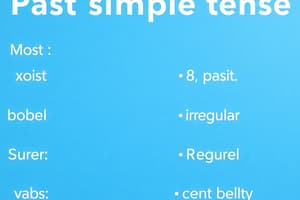Podcast
Questions and Answers
We use the past tense to talk about: I met my wife in 1983. We went to Spain for our holidays. They got home very late last night. When I was a boy, I ______ a mile to school every day. We swam a lot while we were on holiday. They always enjoyed visiting their friends. I lived abroad for ten years. He enjoyed being a student. She ______ a lot of tennis when she was younger. I met my wife a long time ago.
We use the past tense to talk about: I met my wife in 1983. We went to Spain for our holidays. They got home very late last night. When I was a boy, I ______ a mile to school every day. We swam a lot while we were on holiday. They always enjoyed visiting their friends. I lived abroad for ten years. He enjoyed being a student. She ______ a lot of tennis when she was younger. I met my wife a long time ago.
walked
Past simple questions and negatives We use did to make questions with the past simple: Did she play tennis when she was younger. Did you live abroad. When did you meet your wife. Where did you go for your holidays. But questions with who often don't use did: ______ discovered penicillin. ______ wrote Don Quixote. We use didn't (did not) to make negatives with the past simple: They didn't go to Spain this year. We didn't get home until very late last night. I didn't see you yesterday.
Past simple questions and negatives We use did to make questions with the past simple: Did she play tennis when she was younger. Did you live abroad. When did you meet your wife. Where did you go for your holidays. But questions with who often don't use did: ______ discovered penicillin. ______ wrote Don Quixote. We use didn't (did not) to make negatives with the past simple: They didn't go to Spain this year. We didn't get home until very late last night. I didn't see you yesterday.
Who
We can also use the past simple to refer to the present or future in hypotheses (when we imagine something). See these pages: Simple Past Tense: How to Use It, With Examples
We can also use the past simple to refer to the present or future in hypotheses (when we imagine something). See these pages: Simple Past Tense: How to Use It, With Examples
past simple and hypotheses
Flashcards are hidden until you start studying




